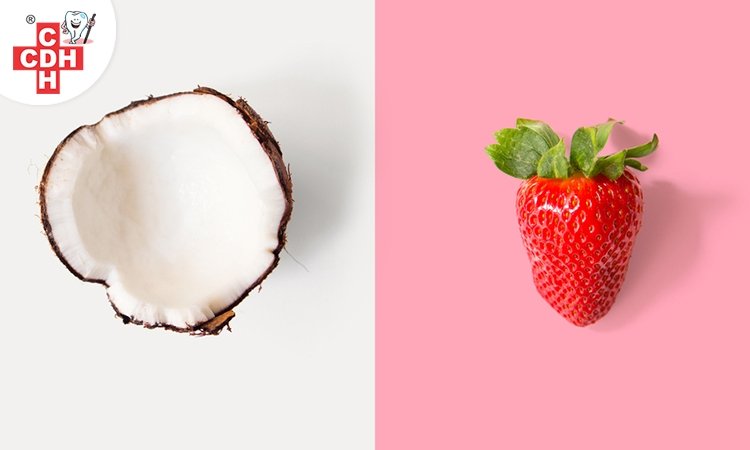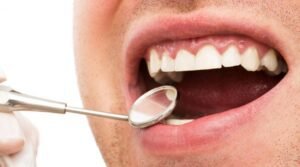Sensitive Teeth to certain Foods
If you’ve ever felt pain after eating hot soup or ice cream, you’re not alone. While discomfort from extreme temperatures may be a sign of tooth decay, it’s also common in people with sensitive teeth.
Dentin hypersensitivity, or tooth sensitivity, is when teeth become painful or uncomfortable in response to certain stimuli, such as hot or cold temperatures.
It can affect one tooth, many teeth, or all of the teeth in one person, and it can be a short-term or long-term issue. While sensitive teeth might have a variety of reasons, the majority of them can be readily remedied by altering your dental hygiene routine.
What makes teeth sensitive?
People with sensitive teeth may feel pain or discomfort when specific triggers are present.
This discomfort may be felt at the tooth roots of the troubled teeth.
Among the most typical causes are:
- Piping hot food and drink
- Chilly foods and drinks
- sweet meals and drinks and chilly air
- Sour foods and drinks
- Using mouthwashes with alcohol after brushing or flossing your teeth
- Over time, your symptoms could vary without any known reason. They could be light or strong.
What leads to tooth sensitivity?
Some individuals usually have teeth that are more sensitive than others because their enamel is thinner. The enamel is the tooth’s protective outer covering.
The enamel of the tooth can frequently deteriorate as a result of:
- Overly aggressive tooth brushing
- Grinding your teeth at night when consuming or routinely consuming acidic meals and beverages
- Tooth sensitivity can occasionally be caused by other conditions. For instance, gastroesophageal reflux disease (GERD) can result in acid reflux from the stomach and esophagus, which over time, may erode teeth.
- Acid can erode the enamel in conditions like gastroparesis and bulimia that frequently produce vomiting.
How are sensitive teeth identified?
Make an appointment with your dentist if this is the first time you’ve noticed tooth sensitivity.
At City Dental Hospital, you may make a dental appointment with a professional dentist to diagnose. They will examine the condition of your teeth and search for any issues that might be causing the discomfort, such as cavities, loose fillings, or receded gums.
During your regular teeth cleaning, your dentist can perform this. They’ll do a visual inspection and clean your teeth. They could use dental tools to touch your teeth to check for sensitivity gently, and they might also request an X-ray to rule out other possibilities like cavities.
Sensitive Tooth Treatment
You might try over-the-counter dental remedies if your tooth sensitivity is minimal.
Choose a toothpaste with the claim “specially formulated for sensitive teeth” on the packaging. These kinds of toothpaste won’t include any irritants, and they may even have desensitizing chemicals that assist prevent discomfort from reaching the tooth’s nerve.
Use an alcohol-free mouth rinse when it comes to mouthwash because it won’t irritate sensitive teeth as much.
Brushing more delicately and with softer toothbrushes might also be beneficial. Soft toothbrushes will have appropriate labels.
These treatments often require numerous applications to be effective. Within a week, an improvement ought to be seen.
You might ask your dentist about prescription toothpaste and mouthwash if home remedies are unsuccessful.
Common foods that cause sensitive teeth
While eating meals that are extremely hot or cold might hurt your teeth, avoiding these eight items, in particular, may provide some relief:
- Soda – this is one of the foods to stay away from if you have sensitive teeth. Soda contains both sugar and acid, which can irritate the nerves of exposed teeth, making it “a double punch.”
- Ice cream- In addition to being cold, ice cream contains sugar, which makes teeth more sensitive. People with sensitive teeth lack the enamel layer that functions as a protective barrier. The warmth of the meal may be more irritated without that coating of enamel to protect your nerves.
- Hot Beverages – Additionally, eating hot meals and sweetening steaming coffee/tea with sugar might irritate your teeth. You should put some milk in your coffee/tea and consume it. Adding milk helps somewhat to reduce the coffee/tea’s warmth and acidity, making it less harmful to your teeth.
- Sweet Candies- Avoid candies like peppermints and lollipops if you have sensitive teeth. They contain a lot of sugar, which can hurt teeth, and they also run the risk of breaking or chipping teeth.
- Sweet gums/toffees- These sugary sweets, particularly for those with sensitive teeth, have certain drawbacks, including toffee, caramel, gummy bears, and licorice. In addition to being loaded with sugar, they might cling to your teeth.
The nerves in the dentine, which are comparable to tooth enamel but less rigid and include small microscopic pores to expose the nerves further, can be stimulated by extremely sweet and sticky meals.
- Citrus fruits – extremely acidic fruits like pineapple, grapefruit, lemons, and limes might make your teeth more sensitive. This is because they cause tooth enamel to erode. Remember that both consuming these fruits and consuming the fruit juice might cause teeth sensitivity and discomfort.
- Ice – Even if you can handle chilly drinks, avoid the practice of biting ice since it might irritate sensitive teeth. Ice is also quite hard and cold
When you consume sugar, it may harm your teeth if they are sensitive or damaged. Dental issues, including cavities and enamel loss, can contribute to increased tooth sensitivity.
Maintaining good oral hygiene helps keep your teeth strong and less susceptible to stimuli, such as sugary meals.
Your teeth may hurt when you eat or drink something that is hot or cold if you have sensitive teeth.
Conclusion
Consult at City Dental Hospital if you have sensitive teeth and your symptoms last more than a few weeks or become intolerable. Sensitive teeth could be a sign of a more serious health problem that requires treatment, like a cavity or an abscess.















